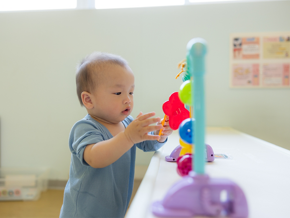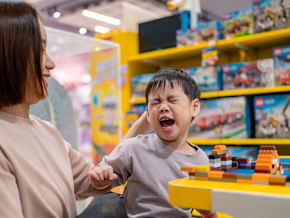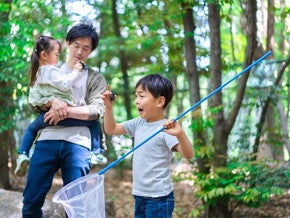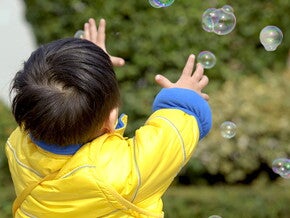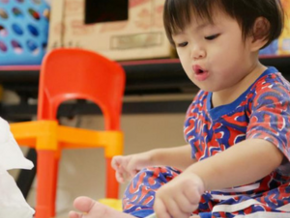
In the first few years of life, a child's brain forms over a million new connections every second, a pace that never gets repeated again, UNICEF points out. And that's where brain games come in. They give your child's mind the workout it needs to feed these connections.
At this early childhood stage, brain exercises serve not only to distract or keep your little one entertained. They allow your child to build thinking, memory, language, and problem-solving skills in ways that feel natural and fun.
And when YOU play these games with your child, that connection becomes just as valuable as the learning itself.
What We Mean by Brain Games
Early childhood experts believe the primary benefit of brain games for babies comes from the time you spend playing them with your child. The games provide the opportunity for you to talk and respond to your little one.
This back-and-forth communication, which Harvard’s Center on the Developing Child calls "Serve and Return," nourishes your child's rapidly growing brain. Here's how it works:
1. Notice the "serve."
When your baby looks at something, babbles, smiles, or even kicks their legs excitedly, that's called a "serve." It’s your baby's way of saying, “Look!" or "I’m curious!”
You can't notice all these little signals, of course. Instead, you can find small pockets of time during your day to have that back-and-forth with your little one, whether it’s through a smile, a sound, or, you guessed it, a brain game.
2. Return the serve.
When you see or hear the serve, it's time to respond or make a "return." That could mean smiling back, copying their babble, naming what they’re pointing at, or just showing interest. These responses tell your child they have your attention, and they make a big difference in how safe and motivated they feel to keep learning.
3. Give it a name.
When your baby touches their toes or your toddler points at a bird, say it out loud: "Those are your toes!" or "Yes, that's a bird!" Returning a serve by naming what your child is focused on helps them connect words with their experiences, even before they can talk.
4. Take turns…and wait.
Keep the interaction going by giving your child a chance to respond, even if it’s just a look or a sound. Waiting gives their brain time to process and respond. That pause helps teach them how conversations work: I say something, you say something back.
5. Watch for the ending.
When your child turns away, picks up a new toy, or starts fussing, it's a sign they’re ready to move on. Respecting these cues helps build their confidence, independence, and trust in you.
Below, you'll find brain games inspired by recommendations from the Center on the Developing Child and UNICEF. These activities are designed to support the serve-and-return interactions that help your baby’s brain grow.
Brain Games at 2 to 3 Months

Emory University psychologists found that a baby’s brain appears "hardwired" to recognize faces.
The brain games during this stage don't need to be complicated. In fact, the simpler and more repetitive, the better.
1. Face time
Nope, not the video calling app of the iPhone. Newborns are naturally drawn to faces. This activity means letting your baby study your face while you talk, smile or raise your eyebrows. It helps build attention span and facial recognition.
2. Visual play
High-contrast patterns are easier for newborn eyes to see. AskDrSears suggests holding up black and white books or visual stimulation cards about 20 to 30 cm (8 to 12 in) away from your baby's face, and watch how their expressions change! You can also move the image from side to side to help them track it.
3. Just sing
Lay your baby on their back and sing a melody to them. While you sing, gently tap the soles of their feet in rhythm with the song. Singing sharpens hearing and teaches your baby that sound has direction and meaning. Try these Filipino lullabies and nursery rhymes!
Brain games at 4 to 6 Months
At this stage, your baby benefits from fun games that help them learn how to pay attention, remember things for a short time, and start practicing self-control.
4. Mirror time
Place an unbreakable mirror in front of your little one, and watch them talk and touch the "other" baby they see. Mirror time gives your baby an excellent opportunity to develop self-awareness. You can also use a mirror to entertain your baby during tummy time!
5. Peekaboo
This brain game never gets old. Hide your face behind your hands or a cloth, then "pop out." This type of play helps your baby remember who's hiding and is ideal for building basic self-control skills. You can have the baby wait for you to pop your face out, or let them control when to reveal you.
6. Finger play
Babies really enjoy songs and chants with simple hand motions. They can pick up on the movements and remember the order of things with a bit of practice. Sing "I Have Two Hands" and act it out!
Brain games at 7 to 12 Months
Babies approaching their first 12 months need mind games where they can learn about cause and effect, memory, and object permanence.
7. Find the toy
Hide a toy under a small cloth while your baby watches. Let them try to lift the fabric or search for it. When your baby finds the toy, clap your hands and say, "You found it!" This activity strengthens your baby's memory and teaches them to stay focused on a goal.
8. Stacking cups or bowls
Give your baby a few plastic cups or containers to bang, nest, or knock over. These actions build hand control and an understanding of cause and effect, which are both early forms of logical thinking.
9. Point and explain
Each time you go out, point out and chat about the different things you see with the baby. Yes, they can't talk yet, but they learn language skills by listening to you. For example, if the baby spots something or points at the supermarket, say what it is ("This is an orange!") and describe it ("It's a fruit and a color. Its shape is a circle").
Brain Games for Toddlers (1 to 3 Years)
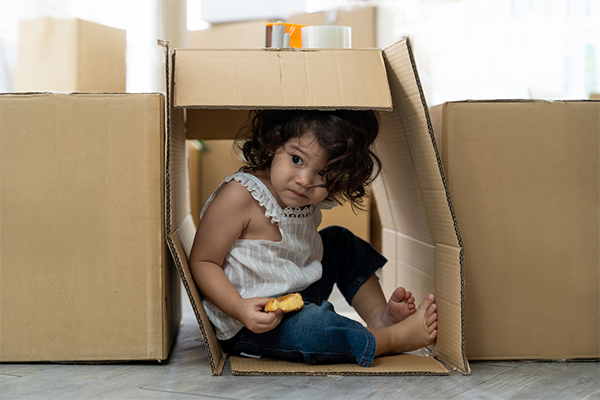
Many of the best games for kids to play can be done with everyday household items and a little imagination.
When your little one becomes a toddler, they're super curious and have a lot to say. They love pushing limits, asking questions (in whatever way they can), and figuring out how stuff works.
These learning games for kids support independence, build thinking and memory skills, and language development. (Check these Montessori toys that help children develop problem-solving skills.)
10. Matching and sorting
Use socks, blocks, picture cards, or snacks with similar shapes. Lay them out and encourage your child to find the ones that match. This brain game develops memory and teaches your child to recognize patterns.
Or you can also give your little one toys or objects in different colors and shapes. Ask them to group them into boxes or piles. This sorting game helps toddlers understand how things are similar or different.
11. Memory game
Grab three cups and three small items to hide, like a toy car or a small ball. Show each item to the child, say what it is, and hide it under a cup. Ask, "Where's the car?" and let them lift the cup they think it's under. Praise them for correct guesses, and if they're wrong, encourage them to try another cup.
12. Puzzles
Older toddlers often have fun with puzzles that involve shapes and colors. You can help the kids figure out where each piece goes or prompt them to think about what shape or color they need or what to do if something doesn't fit.
13. Dump and fill
You've probably seen your baby remove all the toys you just put away in a toy bin. Join in on the fun by giving them different containers, like empty mixing bowls, boxes, or baskets, along with safe things to fill them up with, like toys, socks or dirty laundry!
14. What's mom/dad doing?
Get a toddler to copy what you’re doing while you play together. For example, start lining up some toy cars or piling stuffed toys on top of one another. Then encourage them to do the same, and when they do, compliment them, like, "Good job, you got the cars all lined up and ready to go!" or "Check out that bear tower you built!"
15. Storytime with pauses
Read a familiar book and leave out the last word of a sentence so your toddler can finish it. Use books with rhythm or repetition to make it easier. This encourages active listening and helps toddlers predict what comes next, which is helpful for early reading skills later on. You can find more tips in this article about reading strategies for toddlers.
Brain Games Don't Have to Be Complicated
Educational games for kids should always be rooted in play because it's how kids learn without having to force them to do so. And in the first 1,000 days, the best activities are the simple ones, like making funny faces or hiding a toy under a blanket and watching your baby try to find it.
These playful moments may not seem like they’re doing much for your child’s brain development. But they help your little one pick up skills that sharpen their thinking and boost their curiosity. Plus, these experiences build their confidence and help them explore the world around them.
Make the most of these brain-building moments. Follow your child's lead and make it part of routines, like diaper changes or bath time. Most importantly, play these brain games with them!
What's your favorite brain game to play with your baby? Let us know on the ParentTeam Moms and Dads Facebook Group!
References
Center on the Developing Child at Harvard University. “Brain-Building Through Play: Activities for Infants, Toddlers, and Children - Center on the Developing Child at Harvard University,” March 14, 2025. Accessed September 5, 2025. https://developingchild.harvard.edu/resources/handouts-tools/brainbuildingthroughplay/.
“Earliest Look at Newborns’ Visual Cortex Reveals the Minds Babies Are Born With,” accessed September 5, 2025, https://news.emory.edu/features/2020/03/esc-newborn-visual-cortex/.
Harvard Graduate School of Education. “Play Helps Children Build Better Brains. Here Are Some Ways to Get Kids Learning,” January 14, 2025. Accessed September 5, 2025. https://www.gse.harvard.edu/ideas/usable-knowledge/25/01/play-helps-children-build-better-brains-here-are-some-ways-get-kids.
Read on Arizona. “Smart Talk,” April 24, 2024. Accessed September 5, 2025. https://readonarizona.org/resources/smart-talk/.
UNICEF. “21 Learning Activities for Babies and Toddlers.” Accessed September 5, 2025. https://www.unicef.org/parenting/child-care/21-learning-activities-babies-and-toddlers.
Centers for Disease Control and Prevention. “What Is a Developmental Milestone?,” September 26, 2024. Accessed September 5, 2025. https://www.cdc.gov/ncbddd/actearly/milestones/index.html.










